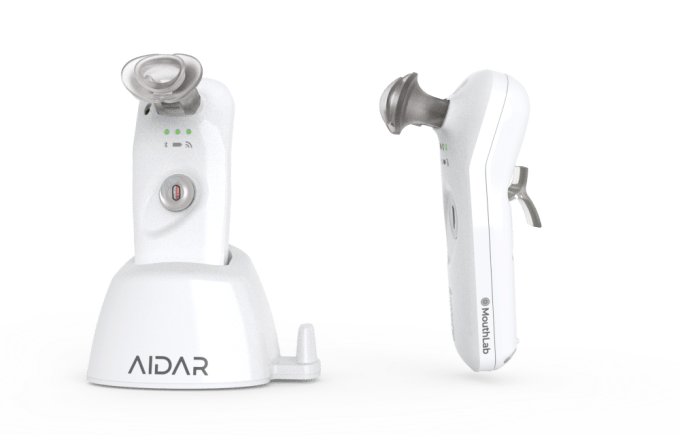Sathya Elumalai was finding it hard to manage his mother’s health after she was diagnosed with four chronic conditions. Rather than guess her health status for the day, he decided to co-found Aidar Health, to get that information directly and reliably.
In founding Aidar, Elumalai also created and launched MouthLab, a device it claims tracks 10 key health parameters in under a minute. The company is part of the Battlefield 200 at TechCrunch Disrupt 2022.
“For a car you have this check engine light that helps you to say, now it’s time for you to take your car [to a] dealer or mechanic to get it fixed. Similarly, our device acts as a as a way to monitor your health every day, to provide a more holistic view of an individual’s health,” Elumalai said. “So if there is any abnormalities, or any changes in that health from their baseline, the device can alert and inform the user about those changes, and what can they do to help manage their health. Or use the same data to communicate with their physician or caregivers to better assess the health condition or changes or deviations in health at the very early stage.”

A user holds the iPhone-sized device and puts their mouth on the mouthpiece, breathes normally and positions their hands on the device as instructed. The company claims MouthLab will record temperature, respiration rate, pulse rate, blood pressure, respiration pattern, heart rate, heart rate variability, ECG, spirometry (i.e. lung function) and oxygen saturation. Data is collected from sensors across the device from saliva, breathing, hand pulse and lips to read the body’s parameters.
In a world where digital and remote care has become the new norm thanks to the COVID-19 pandemic, physicians have often had to go off what their patients say, which is a good starting point but not sufficient for long term care. Although tests and labs are done eventually there hasn’t been an efficient way to track a patient’s vitals at home.
Aidar Health was able to garner Class II FDA 510(k) clearance earlier this month. The clearance states the device may pose some moderate risk to users but allows the company to introduce the product for commercial distribution and market it. It is unclear what risks the clearance was referring to. According to the company, the device has gone through three clinical trials and is embarking on a study in partnership with the VA Health System.
Today, there are over 800 active users of MouthLab and Aidar Health, using it for remote vitals monitoring, chronic care management, and other home health services — as well as “real-world evidence generation efforts with life science companies,” Elumalai said (the latter presumably meaning taking part in studies).
“The device is being used for Remote Physiological Monitoring (RPM), Chronic Care Management (CCM), Hospital at Home (H@H) services with health systems and digital biomarker development, digital companion, and real-world evidence generation efforts with life science companies,” Elumalai told TechCrunch.
The Maryland-based company says they are HIPAA compliant, by using their own LTE/cellular network cloud. Once data is collected it is sent to users via the mobile app and then sent to physicians through Fast Healthcare Interoperability Resources, an API for electronic health records.
The company has decided to run on a subscription-based model, which costs $50-80 per patient per month. Users are provided MouthLab, access to the web and mobile apps, and physicians can collect vitals and analytics. Depending on the usage of the service, pricing can vary.
“It’s hard to really decipher what patients are really going through,” Elumalai said. “But a device like this, before we even get hold of a physician to telemedicine, we can get the data to them instantly. So they get a full snapshot of the patient medical history, a longitudinal analysis of the data for the past few days.”
Aidar Health aims to provide physicians with consistent patient vitals by Andrew Mendez originally published on TechCrunch
source https://techcrunch.com/2022/10/21/aidar-health-aims-to-provide-physicians-with-consistent-patient-vitals/
Comments
Post a Comment